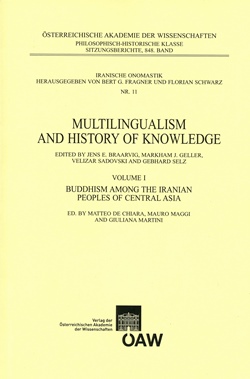Die vorliegende Aufsatzsammlung ist der erste Band der neuen mehrbändigen Publikation zum Thema Multilingualism and the History of Knowledge, hrsg. von Jens E. Braarvig, Markham J. Geller, Velizar Sadovski und Gebhard J. Selz und veröffentlicht von der Österreichischen Akademie der Wissenschaften, der eine Reihe von Untersuchungen zu sprach- und religionsübergreifenden Kulturbeziehungen in Zentralasien in sich vereint.
Das Interesse an der historisch-vergleichenden und kontrastiv-typologischen Erforschung des Phänomens der Vielsprachigkeit hat in den letzten Jahrzehnten weltweit kontinuierlich zugenommen, insbesondere im Hinblick auf die Kulturgeschichte Irans und Zentralasiens, aber auch in Bezug auf die kulturellen und intellektuellen Austauschprozesse auf dem gesamten Territorium des sogenannten „Asia Maior“ von der Antike bis zur frühen Moderne. Aus diesem Grund verband sich eine Reihe einschlägiger Forschungsprojekten aus mehreren Ländern in ein interdisziplinäres Forum, das auf den Gebieten des Multilinguismus, der Linguae francae und der Wissens- und Wissenschaftsgeschichte in verschiedenen sprachlichen und chronologischen Kontexten – die von der Österreichischen Akademie der Wissenschaften koordinierte Multilingualism Research Group, deren Aktivitäten in mehreren Jahrestreffen gipfelten, welche in den Jahren seit 2008 unter der Patronanz diverser wissenschaftlicher Institutionen Europas und Asiens regelmäßig stattfanden. Der Kreis der in die wissenschaftliche Debatte engagierten Partnerinstitutionen innerhalb der Multilingualism Research Group hat kontinuierlich zugenommen und vereint derzeit Partner von der Universität Oslo, dem Excellenzcluster TOPOI und dem Berlin Center for the History of Knowledge an der Freien Universität zu Berlin und dem Institut für Wissenschaftsgeschichte bei der Max-Planck-Gesellschaft, der Universität Bologna, der Ludwig-Maximilians-Universität München, dem DARIOSH-Projekt der Universität L’Orientale in Neapel und der Universität Viterbo, der Universität La Sapienza, Rom, der Universität Verona, der Universität Wien und dem Institut für Iranistik der Österreichischen Akademie des Wissenschaften.
Band 1 der Serie, Buddhism among the Iranian Peoples of Central Asia, hrsg. von Matteo De Chiara, Mauro Maggi und Giuliana Martini, widmet sich den sprachlichen und kulturellen Kontakten der iranischen Völker mit diversen Kulturtraditionen von Indien und dem mittelalterlichen Mittleren und Fernen Osten sowie mit dem Einfluß des literarischen und religiösen Erbes des Buddhismus auf ihre Zivilisationen. Band 2 erscheint unter dem Titel Linguistic Developments along the Silkroad: Archaism and Innovation in Tocharian, hrsg. von Olav Hackstein und Ronald I. Kim; in Vorbereitung befindet sich auch Band 3, hrsg. von Velizar Sadovski und Gebhard J. Selz.
…
This is the first issue of the new multi-volume publication on the subject of Multilingualism and the History of Knowledge, edited by Jens E. Braarvig, Markham J. Geller, Velizar Sadovski and Gebhard J. Selz and published by the Austrian Academy of Sciences, uniting a number of papers on cross-linguistic and cross-religious cultural relations in Central Asia.
Historical-comparative and contrastive-typological studies of the phenomenon of Multilingualism have been continuously increasing in the last decades, especially for what concerns the cultural history of Iran and Central Asia – but also cultural and intellectual processes on the entire territory of the so-called “Asia Maior” from Antiquity up to the Early Modern period. For this reason, a series of relevant research projects of several countries joint into an interdisciplinary forum working on topics of multilingualism, linguae francae and history of knowledge and science in different linguistic and chronological contexts – the ultilingualism Research Group, co-ordinated by the Austrian Academy of Sciences, whose activities culminated in a series of annual meetings that have been regularly taking place in the last years from 2008 onwards, hosted by various scholarly institutions of Europe and Asia. The circle of partner institutions engaged in the scholarly debates within the Multilingualism Research Group has been constantly increasing and, at present, unites partners from the University of Oslo, the TOPOI Cluster of Excellence and the Berlin Center for the History of Knowledge at the Freie Universität and the Max Planck Institute of History of Science in Berlin, the University of Bologna, the Ludwig-Maximilians-Universität of Munich, the DARIOSH Project at L’Orientale University of Naples and the University of Viterbo, La Sapienza University of Rome, the University of Verona, the University of Vienna and the Institute of Iranian Studies of the Austrian Academy of Sciences.
The vol. 1 of the series, Buddhism among the Iranian Peoples of Central Asia, ed. by Matteo De Chiara, Mauro Maggi and Giuliana Martini, is dedicated to the linguistic and cultural contacts of Iranians with various cultural traditions from India and the mediaeval Middle and Far East as well as with the impact of the literary and religious heritage of Buddhism on their civilizations. Vol. 2 appears under the title Linguistic Developments along the Silkroad: Archaism and Innovation in Tocharian, ed. by Olav Hackstein and Ronald I. Kim; in preparation is also vol. 3, ed. by Velizar Sadovski and Gebhard J. Selz.




